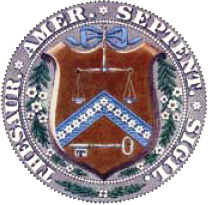United States Department of the Treasury
United States Department of the Treasury (often referred to simply as the Treasury) is an executive department of the United States federal government responsible for managing the government's revenue and the economy. Established by an Act of Congress in 1789 to manage government revenue, the Treasury prints all paper currency and coins in circulation through the Bureau of Engraving and Printing and the United States Mint. It also collects all federal taxes through the Internal Revenue Service (IRS), manages U.S. government debt instruments, advises on domestic and international financial, monetary, economic, trade and tax policy, and enforces federal finance and tax laws.
History[edit | edit source]
The creation of the Treasury was necessitated by the need to manage the debts incurred during the American Revolutionary War and to establish a national currency. Alexander Hamilton, the first Secretary of the Treasury, played a pivotal role in its formation and in the establishment of the national banking system.
Functions and Responsibilities[edit | edit source]
The Department of the Treasury performs a critical role in the economic policy of the United States. Its main functions include:
- Printing and Minting Currency: The Treasury is responsible for producing all United States currency, both paper and coins, ensuring a stable and safe form of money for the American economy.
- Collecting Taxes and Revenue: Through the IRS, the Treasury collects taxes, duties, and fees from individuals and businesses, which fund the federal government's operations and programs.
- Managing Federal Finances: This includes managing the federal budget, government accounts, and public debt. The Treasury issues Treasury bonds, notes, and bills to finance government operations.
- Advising on Economic Policy: The Treasury advises the President on economic and financial issues, including domestic and international economic policy, financial market oversight, and financial regulation.
- Enforcing Federal Finance and Tax Laws: Through its various bureaus, including the IRS and the Financial Crimes Enforcement Network (FinCEN), the Treasury enforces laws related to finance and taxation, combating financial crimes like money laundering and financing of terrorism.
Organization[edit | edit source]
The Department of the Treasury is headed by the Secretary of the Treasury, a member of the President's Cabinet. Below the Secretary, the Treasury is divided into several bureaus, including:
- Bureau of Engraving and Printing
- United States Mint
- Internal Revenue Service (IRS)
- Bureau of the Fiscal Service
- Financial Crimes Enforcement Network (FinCEN)
- Office of the Comptroller of the Currency (OCC)
Significant Legislation[edit | edit source]
Over the years, several pieces of legislation have significantly impacted the Treasury's operations, including the creation of the IRS, the establishment of the Federal Reserve System, and laws enhancing financial regulation and combating money laundering.
Challenges and Criticisms[edit | edit source]
The Department of the Treasury faces various challenges, including managing the national debt, ensuring tax compliance, and combating financial crimes. It has also faced criticism over its policies and the effectiveness of its enforcement efforts.
See Also[edit | edit source]
Navigation: Wellness - Encyclopedia - Health topics - Disease Index - Drugs - World Directory - Gray's Anatomy - Keto diet - Recipes
Search WikiMD
Ad.Tired of being Overweight? Try W8MD's physician weight loss program.
Semaglutide (Ozempic / Wegovy and Tirzepatide (Mounjaro) available.
Advertise on WikiMD
WikiMD is not a substitute for professional medical advice. See full disclaimer.
Credits:Most images are courtesy of Wikimedia commons, and templates Wikipedia, licensed under CC BY SA or similar.
Contributors: Prab R. Tumpati, MD






